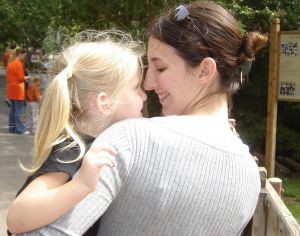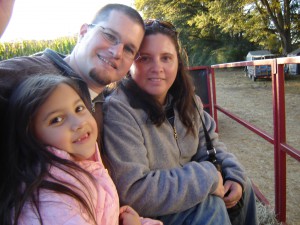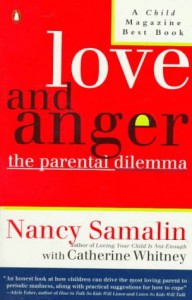 I feel it is such a sign of true strength when parents can be honest with themselves and others that they, too, struggle.
I feel it is such a sign of true strength when parents can be honest with themselves and others that they, too, struggle.
Especially with Attachment Parenting (AP), many parents feel that they have to be “perfect” but that is an impossible standard. We all have moments where our knee-jerk reactions get the best of us.
Just the other day, I stubbornly insisted my oldest daughter was the one misunderstanding a situation. She was in tears, and I was adamant that I was “right.” It was a little past our usual lunch time, but it didn’t even dawn on me that perhaps I was seeing things in a different light because I needed to eat.
And then as soon as I got some food in me, my mood mellowed out and I quickly realized that I was completely in error in how I related to my daughter. So I apologized and we talked about how I need to work on taking care of myself better so I’m not taking out my low blood sugar on others.
Emotion coaching is such a huge part of AP. It’s not that AP parents always have it together, that we are superhuman in handling our strong emotions and therefore never raise our voices or give in to our knee-jerk reactions. It’s that we are comfortable with teaching our children that all of their — and our — emotions are healthy. We don’t need to be scared of our emotions, and there are ways to work through them in a healthy way.
That includes when we’re thinking thoughts that we think “real AP parents” never think of. Ha! It’s not that other AP parents don’t have these thoughts, and sometimes the actions that go with those thoughts, but rather how we repair the disconnection that happens when those thoughts/actions arise.
I try not to sweat an occasionally hard day of relating with my kids. But when I get into a pattern of relating with disconnection, I go back to Attachment Parenting International’s Eighth Principle of Parenting: Strive for Balance. I also go back and re-read my AP books to relearn and remind myself of what I’ve been taking for granted.
Earlier in my “career” as a mother, I had a very difficult time with API’s Sixth Principle of Parenting: Practice Positive Discipline. It took me seemingly forever to get the healthy patterns in place to change my mindset from punitive discipline to positive discipline. I was particularly vulnerable to others’ opinions of my parenting approach, especially from disapproving family members.
When I was a younger mother, and still figuring out how AP was going to work in our home, as well as healing my own childhood emotional wounds, it helped me so much to talk to parents who had “gone before” me and whose children were living proofs that AP works. There are times in the early years when it seems to some parents new to AP that this child-rearing approach might be setting a child up to be aggressive or “spoiled,” but so much of that perspective is part of the growing pains of wrapping the non-AP brain around the concept of Attachment Parenting.
The development is different for a toddler who is being raised AP than for a toddler who is raised in a way where strong emotions are suppressed, but when a child is raised with guidance through API’s Eight Principles of Parenting, the seemingly difficult toddler grows into a child very aware of his or her emotions who is empathetic and creative and exceptional at problem-solving.
I’m seeing it in action with my own children, the oldest of whom is 8 years old. And I’ve seen it in action with others’ AP-ed children, some who are in their teens or preteens and even a few who are grown, married and are raising a second-generation of AP kids. Attachment Parenting works.
There were times when I would have to remind myself that my child acts a certain way, because he or she was not raised with an iron hand or where crying was punished — and that is OK. For example, some of my family members’ views on children are that they are “to be seen and not heard, and preferably not even to be seen.” Children are expected to play by themselves in an out-of-the-way room while the grown-ups talk together. But my kids are used to, and like to, be part of the togetherness of family. They don’t want to be out of the way; they want to be with and connect with the grown-ups.
Some of my family members may see this behavior as impolite or bothersome. And that is OK. What any one person defines as “good” behavior is subjective.
What’s more important to me is that my children are absorbing the values I want them to have as adults — and right at the top of the list is a desire to connect with others, emotional health and authenticity. So much of that is how I respond when my own strong emotions come up — like anger, sorrow, fear, disappointment, jealousy, embarrassment and others — especially when I didn’t deal with them well the first-time around.
My children are learning how to navigate life from me, and it’s important that part of what they learn is how to navigate when I make mistakes in my relationships so they know how to do that when they are parents themselves.
 Some parents misconstrue Attachment Parenting (AP) as promoting undisciplined children and martyred parents, when in actuality, Attachment Parenting has a strong basis in discipline and balance.
Some parents misconstrue Attachment Parenting (AP) as promoting undisciplined children and martyred parents, when in actuality, Attachment Parenting has a strong basis in discipline and balance.



